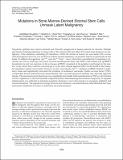Mutations in Bone Marrow-Derived Stromal Stem Cells Unmask Latent Malignancy
Author(s)
Houghton, JeanMarie; Li, Hanchen; Fan, Xueli; Liu, Yingwang; Liu, Jian Hua; Rao, Varada P.; Poutahidis, Theofilos; Taylor, Christie L.; Jackson, Erin A.; Hewes, Christine M.; Lyle, Stephen; Cerny, Anna; Bowen, Glennice; Cerny, Jan; Moore, Nathan; Kurt-Jones, Evelyn A.; Erdman, Susan E.; ... Show more Show less
DownloadHoughton-2010-Mutations in Bone Marrow-Derived.pdf (678.9Kb)
PUBLISHER_POLICY
Publisher Policy
Article is made available in accordance with the publisher's policy and may be subject to US copyright law. Please refer to the publisher's site for terms of use.
Terms of use
Metadata
Show full item recordAbstract
Neoplastic epithelia may remain dormant and clinically unapparent in human patients for decades. Multiple risk factors including mutations in tumor cells or the stromal cells may affect the switch from dormancy to malignancy. Gene mutations, including p53 mutations, within the stroma of tumors are associated with a worse clinical prognosis; however, it is not known if these stromal mutations can promote tumors in genetically at-risk tissue. To address this question, ApcMin/+ [superscript Min /+] and ApcMin/+ [superscript Min /+] Rag2−/− mice, which have a predilection to mammary carcinoma (as well as wild-type (wt) mice), received mesenchymal stem cells (MSC) with mutant p53 (p53MSC) transferred via tail vein injection. In the wt mouse, p53MSC circulated in the periphery and homed to the marrow cavity where they could be recovered up to a year later without apparent effect on the health of the mouse. No mammary tumors were found. However, in mice carrying the ApcMin/+ [superscript Min /+] mutation, p53MSC homed to mammary tissue and significantly increased the incidence of mammary carcinoma. Tumor necrosis factor (TNF)-α-dependent [(TNF)-alpha-dependent] factors elaborated from mesenchymal cells converted quiescent epithelia into clinically apparent disease. The increased cancer phenotype was completely preventable with neutralization of TNF-α [TNF-alpha] or by transfer of CD4+ regulatory T cells from immune competent donors, demonstrating that immune competency to regulate inflammation was sufficient to maintain neoplastic dormancy even in the presence of oncogenic epithelial and stromal mutations. The significant synergy between host immunity and mesenchymal cells identified here may restructure treatments to restore an anticancer microenvironment.
Date issued
2010-07Department
Massachusetts Institute of Technology. Division of Comparative MedicineJournal
Stem Cells and Development
Publisher
Mary Ann Liebert
Citation
Houghton, Jeanmarie et al. “Mutations in Bone Marrow-Derived Stromal Stem Cells Unmask Latent Malignancy.” Stem Cells and Development 19.8 (2010) : 1153-1166. Copyright © 2010, Mary Ann Liebert, Inc.
Version: Final published version
ISSN
1547-3287